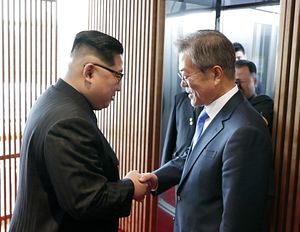Peace on the Korean Peninsula could deliver significant economic benefits for both North and South, including potentially a market re-rating for Seoul stocks. However, analysts have cautioned against excessive optimism, given the enormous gulf between the two Koreas and the costs of reunification.
While skeptics and optimists remain divided on the prospects for lasting peace, the recent inter-Korean summit has reignited hopes of an end to the Cold War conflict. The result could be a “peace dividend” for both nations, including financial markets.
“South Korea’s stockmarket has always been the cheapest market in Asia in terms of valuations. It’s had this huge discount due to North Korea and is a market that most investors have been consistently underweight in, so anything significant that happens there regarding the peace process could have a major impact on valuations,” Rob Mann, senior portfolio manager of Asian equities at Nikko Asset Management, told The Diplomat.
In addition to geopolitical instability, South Korean companies have long traded at a discount relative to their global peers due to concerns over corporate governance and a lack of transparency, according to analysts.
Yet recent reforms including a stewardship code and measures by “chaebol” conglomerates such as Hyundai and Samsung to trim cross-shareholdings have helped boost confidence, with Korean stocks enjoying outperformance in 2018 compared to their Asian rivals.
As at May 4, the benchmark Kosdaq index of South Korean equities was showing a healthy one-year return of nearly 36 percent, having risen by 7.25 percent in 2018. This compares to the 16 percent one-year return of Japan’s Nikkei Stock Average and the negative 0.4 percent return of China’s Shanghai Composite Index.
“Corporate governance is improving,” Janet Johnston, portfolio manager at TrimTab Asset Management, told Barron’s.
Johnston pointed to improving corporate earnings, an undervalued stockmarket, and increasing dividend payments. The won’s depreciation against the U.S. dollar has also helped South Korean exports, with Seoul successfully navigating a new trade deal with the Trump administration after the U.S. president blasted the previous U.S.-South Korea free trade agreement as a “horrible” pact.
U.S. investment bank Goldman Sachs has suggested peace could lift South Korean stocks, although the gains could be limited by global conditions.
“It seems markets are beginning to price in possible ‘peace dividends,’ albeit modestly for now,” the bank said in a recent report.
Goldman Sachs pointed to gains in the construction, steel, and machinery sectors, as part of potential new infrastructure spending.
Geopolitical factors “could play a bigger role, helping support Korean equities and [the] Korean won, once market concerns over trade tension[s] and sharp rises in bond yields fade.”
Morgan Stanley has stated that South Korean stocks could rise significantly, depending on progress toward economic integration.
“We believe the market could strongly re-rate and possibly overshoot our expectations. We assume 10-15 percent upside to Kospi,” the U.S. investment bank was quoted as saying by the Korea Herald.
However, it also noted that initial optimism over German reunification in 1989 quickly faded. While the German market rallied by up to 28 percent following the fall of the Berlin Wall, stocks tumbled afterwards as the market reassessed the costs involved.
Gareth Leather, senior Asia economist at Capital Economics, has cautioned against expectations of an immediate surge in the South Korean economy due to peace moves.
The landmark summit meeting between the two nations’ leaders “should help to remove a major tail risk for the region’s markets and economies. However, the impact on South Korea’s economy of an easing in tensions is unlikely to be that significant,” he said in an April 27 report.
The economist pointed to the many obstacles remaining toward a peace deal, “not least a lack of trust between the two sides,” amid previous agreements that were later subverted by Pyongyang.
Leather pointed to only a modest market reaction to the April 27 talks, possibly because “a lot could still go wrong over the coming weeks and months of negotiations, and investors are taking a cautious view.”
“More generally, however, events on the Korean Peninsula have not tended to be a big driver of market sentiment. Even at the height of last year’s crisis when Donald Trump was threatening the North with ‘fire and fury,’ the reaction in financial markets was short-lived,” he said.
The immediate impact of a formal peace treaty on the South Korean economy is expected to include improved business and consumer confidence. In the longer term, as in Germany, reunification would result in both costs and benefits.
“The North’s 25 [million] population is relatively young, which would improve the South’s poor demographic outlook. Defense expenditure would also fall,” Leather said.
“But the costs would be enormous. The gulf between the two Koreas is far greater than that between West and East Germany. The South Korean government has previously estimated the cost of rebuilding the North’s economy into its borders at around 100 [percent] of its GDP.”
Nevertheless, the “hermit kingdom” of North Korea may also be eyeing economic gains from the peace process.
North Korea is seen as the only East Asian nation that still has cheap labor and young demographics, offering the potential for a new economic miracle similar to other Asian communist-ruled nations.
“North Korean leadership has witnessed the changes in China and Vietnam, as they have opened up their own economies without relaxing political controls,” Matthews Asia portfolio manager Michael Oh said.
“If you are a young Kim Jong-un and looking at the next 30 years, you are probably thinking you can imitate China or Vietnam.”

































